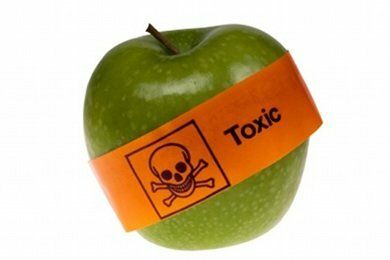How Important Is It To Buy Organic?
May 27, 2011 43 Comments
Snack Girl finally watched "Food, Inc." - and it made her think. She immediately wanted to go out and buy all her food at Whole Foods (where almost all of the produce is organic).

Then I woke up to the cold, hard reality of my bank account. So I did what any serious geek would do - I did a study of the price of organic produce where I live.
I went and did my regular shopping at Stop & Shop and then I took my receipt to Whole Foods. I wrote down all the prices per pound of the organic equivalent of my Stop & Shop purchases - and used them to create this groovy table:
| Produce | Stop & Shop | Whole Foods | Difference |
|---|---|---|---|
| Gala Apples | 2.07 | 3.74 | 1.67 |
| Asparagus | 2.59 | 5.99 | 3.40 |
| Bananas | 3.61 | 5.17 | 1.56 |
| Green Leaf Lettuce | 1.99 | 2.49 | 0.50 |
| Honey Dew Melon | 3.49 | 4.99 | 1.50 |
| Navel Oranges | 1.47 | 3.71 | 2.24 |
| Sweet Potatoes | 3.16 | 7.94 | 4.78 |
| Red Bell Peppers | 1.40 | 3.00 | 1.60 |
| Cauliflower | 2.99 | 3.99 | 1.00 |
| Red Seedless Grapes | 5.43 | 13.05 | 7.62 |
| Spinach | 1.99 | 6.00 | 4.01 |
| Total | 30.19 | 60.07 | 29.88 |
Ouch! It would have cost me twice as much to buy organic for my "once every five days" produce purchase. ARGH!
Doing the right thing for the environment and my children is costly, and I have thought a lot about the choices that I make on a daily basis.
Yes, I feel GUILT when I purchase the strawberries that are 1 pound for $2 and driven to me from California (I live in Massachusetts) - but they taste SO good. I worry about the amount of pesticide my children are devouring when they greedily eat these yummy berries.
Why couldn't I wait until my Massachusetts' farms came up with goods? Isn't local better? What about the environmental impact of my choice?
I can't sleep!
Actually, I can sleep. I made a choice that my children are going to love FRESH food - not processed, packaged crap - FRESH food.
Let's use "Gala Apples" as an example of a fruit that I could have purchased for $1.67 more if I had bought the organic version.
Apples are #4 on the Environmental Working Groups list of the "Dirty Dozen" of fruits and vegetables that have pesticide residue (see: EWG's Shoppers Guide To Pesticides).
Apples had been treated with FORTY-SEVEN different chemicals (the U.S. government did the study). Yikes! But, the EWG agrees with me. From their website:
"We recommend that people eat healthy by eating more fruits and vegetables, whether conventional or organic,”says Ken Cook, president and founder of Environmental Working Group. “... The health benefits of a diet rich in fruits and vegetables outweigh the risks of pesticide exposure.
Remember, that it doesn't mean that the apple you are eating was treated with 47 chemicals. It may have been treated with one or two of the ones that were detected.
My conventional Gala Apples were from New York State, and were probably from an orchard on the small side. The farmers may have lived in the apple orchard - and, guess what? - they don't like spraying lots of pesticides near their home.
The study the EWG is quoting is an average across the nation - your individual produce may not be soaked in chemicals. Of course, unless you bust out your chemistry set in the supermarket - you aren't gonna know what you are consuming.
But, fear of pesticides is a really bad reason to avoid fresh produce.
My suggestion is to buy organic produce when you can afford it and when you can't - don't worry about it.
How do you deal with the high price of organic produce?
Want to read about snacks?
Wow Your Friends This Memorial Day With Salad Sticks
McDonald's Frozen Strawberry Lemonade: Don't Believe The Hype
A New Meaning For The Word "Grass"
Vegan Cupcakes Have Taken Over The World


43 Comments:
Leah
Vladdie
Cristina @ An Organic Wife
Renee @ FeedingOurLives.com
Michelle S
Anna
Dawn K.
Christian
brandi
Grete
Eric Marcotte, MD
Nancy~The Wife of a Dairyman
Sagan
Sarah
Anna
statgirl
Stephanie
Stacie
RC-Rochester
Whitney Gigandet
Stacie
CaroG87
Jenn
Melanie Clark
Cristina @ An Organic Wife
Amanda
Angie
Ali
ashia
Snack Girl
shris
Kathy
Satish
Julie
Judy
Kelly
(:
heidi
Jill smith
Grant Armbruster
A123
ross rossi
joanne ryan